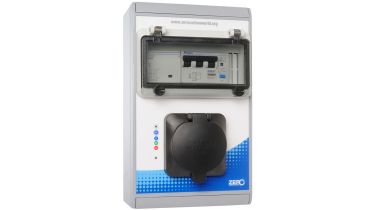Complete guide to the ZeroNet charging network
Funded by charity Zero Carbon World, the ZeroNet charging network features hundreds of points across the UK

The ZeroNet charging network specialises on providing chargers at destinations where drivers are likely to stop for a number of hours, or longer.
At the time of writing, there are 481 ZeroNet charging locations spread across the country, many of which feature more than one charging point.
ZeroNet is funded by Zero Carbon World - a registered charity - which takes donations and offers eligible applicants free charging equipment to entice customers with electric vehicles.
There is no ZeroNet membership scheme, meaning all chargers operate on a pay-as-you-go basis. ZeroNet encourages businesses to offer charging for free, or at most a small fee.
Charging with ZeroNet
Charging on the ZeroNet network is really simple, although users are encouraged to call providers in advance to check availability and pricing.
Many providers will offer charging for free, although some will set a fee to cover the cost of the service. There are no guidelines on flat, hourly or per-kilowatt-hour rates, so fees are entirely at the provider’s discretion.
It’s worth noting that ZeroNet chargers aren’t ‘smart’, so keeping track of how long you’ve been charging or how much energy you’ve consumed will be difficult without checking data from your car.
When you arrive at the charger, you first need to check that the LED light on the charging unit is flashing blue before you can plug in. ZeroNet chargers are ‘untethered’, so you’ll need to bring your own Type 2 cable.
Once you’ve plugged in, the LED light will turn green to indicate that charging has begun. When you electric vehicle as reached a full charge, the light will turn solid blue. Unplug the cable from your vehicle’s end first, before detaching it from the unit.
If a red light is displayed, unplug the cable and reset the unit by opening the cover and flicking the power switch off and then on again. The LED light will go through a reset sequence before flashing blue to show that’s it’s ready.
ZeroNet chargers are unlikely to exceed speeds of 7kW, so a full charge of an electric car is likely to take several hours. If the charger is located at a hotel - and you’re staying overnight - this isn’t a problem. A 40kWh Nissan Leaf will need about six hours for a full charge.
However at a restaurant or retail park, for example, you should expect only a partial top up, depending on the size of your electric car’s battery.
Applying for a ZeroNet charger
If your business meets the criteria, ZeroNet will give you a 32A Type 2 Charging Station and a parking sign, together worth £450.
Once installed, the charging point will be registered on Open Charge Map, which supports a number of websites and smartphone apps that customers will use to find your charger.
Although the equipment is free, you will be expected to cover the cost of installation: Zero Carbon World suggests this could amount from £500 to £1,000, plus VAT.
The charity lists hotels, guesthouses, restaurants and golf courses as examples of suitable businesses, but the only real restriction is that you must have parking that drivers can use for at least three hours in order to be eligible.
Your car park must be secure, and the space with ZeroNet charger must be offered as a priority to electric vehicle drivers. The charger can’t be reserved for members of staff, and you must use the charity’s ‘regional installation partners’.
Maintaining and testing the charger on a regular basis will be the responsibility of your business, and installation must take place within 28 days of receiving the ZeroNet kit.
ZeroNet encourages providers to offer free charging, as the cost of electricity is likely to be outweighed by the value of each driver’s custom. However, if you do wish to charge a small fee, it mustn't be more than you would charge for access to wifi.